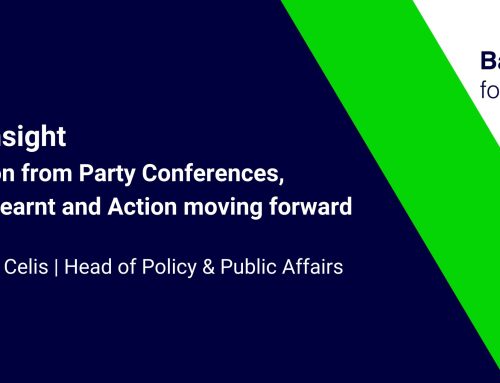Finance Day at COP29 in Baku brought unexpected optimism, marked by vibrant discussions and pragmatic insights on the future of global climate finance. In a candid conversation, Heather Buchanan, Chief Executive of B4NZ, and Chris Hayward, Policy Chairman at the City of London Corporation, reflected on the challenges and hopes for climate action amid shifting geopolitical and economic landscapes. Their views reveal a storyline of perseverance, transformation, and the evolving role of finance in addressing climate change.
The Backdrop: A Welcoming Atmosphere Amid Controversy
Upon arrival, Buchanan and Hayward noted the positive energy that greeted delegates. With 70,000 attendees—nearly double the turnout at COP27 in Sharm el-Sheikh—the atmosphere was buzzing, defying initial concerns that COP29 would be a low-impact gathering. The choice of Azerbaijan as a host, however, had sparked debates about holding climate talks in a petrostate. Buchanan approached this with a characteristic pragmatism: “Engagement over exclusion,” she said, underscoring the importance of including all nations, especially those whose economies have been shaped by fossil fuels.
Azerbaijan’s candid acknowledgment of its dependency on oil and gas was a refreshing reminder that even high-emission countries recognise the necessity of transition. “They understand this has to be a managed transition,” Buchanan noted, emphasising that the demand from Western nations has fueled production. Both leaders felt this open dialogue encouraged mutual understanding rather than the usual finger-pointing, allowing richer discussions on how to move forward.
Breaking Down the Transition: From Commitment to Tangible Change
Reflecting on the gains since COP26, both Buchanan and Hayward agreed that the creation of the Glasgow Financial Alliance for Net Zero (GFANZ) was a turning point, energising private markets and driving investment toward greener solutions. But there was consensus that setting targets is only the first step; translating those commitments into action remains the ultimate challenge. For Buchanan, this is the crux of B4NZ’s mission: “Our focus is on mobilising these commitments on the ground. We need to see more movement, especially in terms of global financial flows.”
Buchanan explained that traditional financial systems and regulatory frameworks, designed over centuries with different values, must evolve to reflect new concepts of risk and value centered around sustainability. “Right now, markets aren’t fully equipped for the massive reallocation of resources we need,” she explained. The UK, as a global finance hub, has a critical role to play here. In Buchanan’s view, the UK’s policy leadership and influence over global finance flows present a unique opportunity to drive this shift. “The political climate has aligned for us, and we have a narrow window to make real strides,” she added.
The Role of London: Leading with Innovation and Influence
Picking up on Buchanan’s focus on the UK, Hayward highlighted London’s pivotal role as the financial capital poised to lead in green finance. London’s expertise in green financial products, along with its historical clout, makes it well-positioned to support international climate finance efforts. On Finance Day, the Corporation announced an initiative co-launched with HMG to create a Transition Finance Council, tasked with overseeing and accelerating the transition to green finance. “It’s unusual to see a joint initiative like this between the government and the City,” Hayward remarked, “but it’s a testament to the critical role London plays as the world’s financial center.”
Hayward noted that the Council will tackle what many initiatives leave untouched: actionable steps and accountability. For him, this partnership reflects a new phase of “public-private collaboration” that will be essential to the transition. It is not simply about policy declarations, he emphasised, but about generating practical solutions for sustainable finance.
Navigating Political Shifts and Public-Private Partnerships
In a year of political shifts, the upcoming return of Donald Trump to the White House weighed on conversations. Both Buchanan and Hayward acknowledged the possible challenges but remained unfazed by political fluctuations. “Politicians come and go, but markets are much stronger forces,” Buchanan commented. While a Trump administration could disrupt policy directions, she and Hayward believed that global markets, driven by finance and private sector commitments, would continue moving forward.
For Hayward, the key to progress lies in stronger public-private partnerships. “Governments set the environment and drive policy, but they can’t deliver on these massive goals alone,” he explained. In Hayward’s view, the private sector’s role in climate financing is indispensable. Echoing this, Buchanan urged a redefinition of “lobbying” to emphasise productive, transparent collaboration. She described the process as “untangling regulatory barriers and ensuring policies align with the climate goals we need to achieve.”
In the UK, Hayward sees promise: “There’s a genuine willingness from the current government to work alongside the private sector.” With the momentum of recent policy directions, he sensed an opening to build stronger partnerships—a crucial element to fulfilling net zero ambitions.
Maintaining Optimism and Setting Realistic Expectations
Despite ongoing cynicism about COP’s effectiveness, Buchanan remains an optimist. She acknowledged the criticisms of COP as an exclusive event yet believes the meetings have generated vital momentum. Since COP26, she has observed the language around climate action evolve from tentative to transformative, with more open dialogues across sectors and geographies. “The tone has changed so much in such a short time. Everyone here is more straight talking, which is refreshing and hopeful,” she noted.
For Hayward, optimism hinges on setting and sticking to ambitious targets. “We can’t afford to manipulate numbers or avoid accountability,” he stated. As COP29 wraps up, his hope is that each commitment will lead to practical progress, bringing the global community closer to net zero goals.
With COP30 on the horizon in Brazil, both Buchanan and Hayward are cautiously optimistic about the next steps. Buchanan is hopeful that increased transparency and commitment to action will push forward the transition. Hayward, too, envisions COP30 as a pivotal moment, potentially showcasing the results of groundwork laid today.
Moving Forward: Actions over Aspirations
COP29 in Baku demonstrates a maturing approach to climate finance. For Buchanan and Hayward, the task ahead is to turn dialogue into delivery, pushing past the promises and into real impact. Both are committed to a future where ambitious targets are matched by actionable steps, steering the global transition from aspiration to achievement. As Buchanan put it, “Each commitment brings us closer—but only if we act on it.”
In their perspectives, COP29 is not the culmination of climate action but another vital chapter in a shared journey, one that will require resilience, collaboration, and a focus on tangible change.



